Bahrain: Banking Industry to Grow by 3% in 2013-2014
Jamal Ali Al-Hazeem, CEO of BMI Bank
As far as the sector or the industry is concerned, I think you will see growth this year in 2013 over last year 2012.
Interview with Jamal Ali Al-Hazeem, CEO of BMI Bank
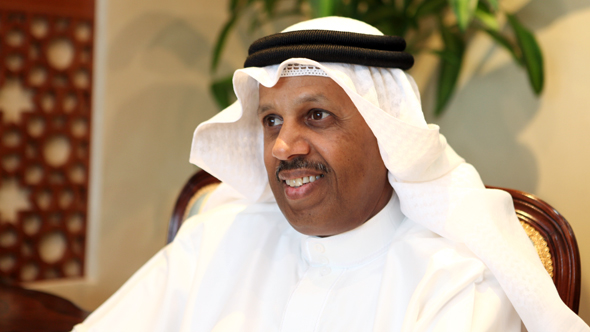
In 2011 we discussed the outlook for the industry and you mentioned that the consolidation is imminent. I have a quote here that the banking sector has seen some consolidation in recent months, most notably among Islamic banks. Ithmaar Bank last year announced its merger with First Leasing Bank and in January of this year there was an announcement of the 3-way merger between Elaf Bank, Capital Management House and CAPIVEST to create an international bank with assets in excess of US $400 million. We have also heard an announcement by the Central Bank of Bahrain that they will make a list of systemically important banks that are too big to fail or they will be under strict regulations.
As far as the sector or the industry is concerned, I think you will see growth this year in 2013 over last year 2012.
These banks are strategically important for the local economy.
Can you give us an overview of the sector and the outlook? Do you see consolidation happening?
I think you missed one that just happened about 3 days ago which was the takeover by the National Bank of Bahrain and GOSI of 52% of Bahrain Islamic Bank. That has happened over the last 3 days which is in its own way another consolidation in the market. I think that’s a positive step in the market because Bahrain Islamic Bank has been facing some challenges and part of those challenges is because the major shareholder was going through a rough time – which is Kuwaiti shareholder. So the fact that National Bank of Bahrain and GOSI have stepped in to take over the controlling stake is a very positive thing for both Bahrain Islamic Bank, the sector, and the market in general.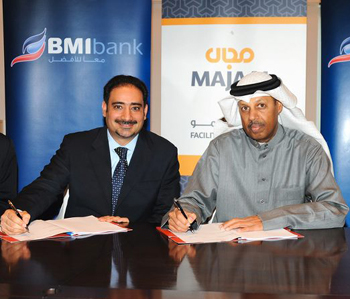
As far as the sector or the industry is concerned, I think you will see growth this year in 2013 over last year 2012. I think you will probably see the growth being led by banks like BBK and you will hopefully see a rebound of Bahrain Islamic Bank after the confidence comes back to the bank with this takeover. I think you will also see more consolidation in the market. This is my own view. I believe this is a very positive step for the banking in Bahrain. The market is over-banked and saturated with lots of small entities. The sooner we get those consolidated, amalgamated or merged into a larger entity, the better it is for the market and for the industry.
What is your growth estimate for BMI Bank for 2013?
That’s difficult to estimate. Last year we grew above the average growth of the market. Our plan this year is to grow within the market but for different reasons. We need to focus more on our liquidity and focus more on the quality of assets. The quality of assets has also helped us this year to improve our rating. S&P improved our rating to stable because of the quality of our assets. We would like to continue doing this in order to hopefully improve our rating further because that will help us in many different ways. Overall, I think BMI Bank will grow either within the market average or slightly above – on both sides of the balance sheet. Last year the market average was about 2.5 or 2.6% and we grew at a higher rate. This year I think it is estimated around 3% so I think BMI Bank will be able to grow by around 3% or slightly higher.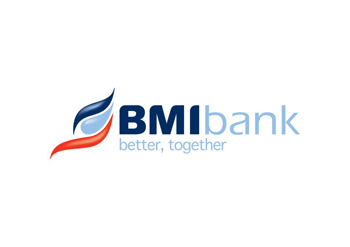
Regarding regulations, what is your opinion about the Central Bank regulations?
The Central Bank of Bahrain is doing a very good job. I’ve been working with the Central Bank in different capacities for the last 33 years. They have been doing a very good job, especially the Governor. I think he’s very focused and very conscious of the challenges facing the industry, and I think he is aware of the regulations that need to be established within the industry in order to protect and regulate the industry. The only concern I have personally as a banker and an economist in this country is you don’t want to be over-regulated in any industry because that will defeat the objective of having something like the financial sector in Bahrain.
I have yet to see the basis or criteria on which the Central Bank will classify some of the banks as strategically important for the local economy. We don’t know the details of that. It was announced in Euro Money by his Excellency the Governor so that is something that we need to see.
In my opinion you are either a free market or a regulated market. Yes, there should be a lot of regulation on the way you do business but I think you should stop at the competition level between financial institutions. In other words, we don’t want to be interfering with the details on how to conduct the business because there is a thin line between regulation and management. You don’t want to cross that line to become involved in the management of the industry rather than regulating it because with management comes responsibility and liability. We are responsible and liable because we’re running the business. I don’t think it’s in the best interest of the industry to cross the line between management and regulation.
This of course implies that the government will select strategically important institutions which would be the largest banks. You are a mid-sized bank so how is this regulation going to touch other – mid-size/small players?
As I said, we don’t know the criteria upon which the selection will take place. Is it the largest banks or not? Because maybe there are large banks but they are not strategically important to Bahrain. You can take a bank that is huge and has an office in Bahrain, but maybe they only employ 50 or 100 people. On the other hand, you may have a small or mid-sized bank that has 500 employees which means 500 families. One hundred percent of the capital of the mid-sized bank is deployed or employed in the local economy whereas one hundred percent of the other bank, which is a huge mega-bank, is deployed outside Bahrain. So the definition of strategically important hasn’t been shared with us yet. We don’t know what the criteria are so it is very tough for me to give an opinion on something I don’t know yet. We will wait until the CBB comes up with the basis upon which the selection will take place and then we will hopefully give our opinion. We will not be quiet. This is one of the good things about Bahrain – our people do listen to the industry.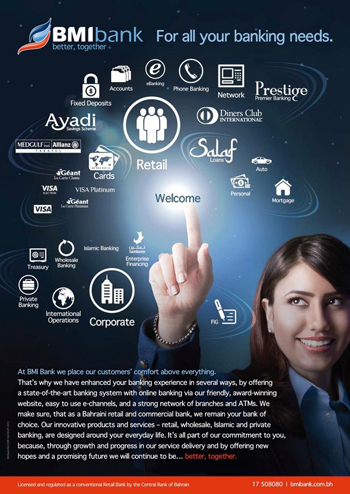
Regarding regulations, what has been done regarding Basel III Accords? What has been the impact of the FATCA (Foreign Account Tax Compliance Act) and also what are the news about the Corporate Credit Reference Bureau?
Corporate Credit Reference Bureau is a positive step towards improving the practices and business within the banking industry because that has been proven by the Consumer Credit Bureau. We are fully supportive of that and I think we have contributed as much as we could to the success of this Corporate Credit Bureau. So that’s a positive step forward because then at least each bank can have a history of the corporation and its credit track record.
As far as FATCA is concerned, I wish the GCC had taken a unified approach to this issue instead of leaving each bank to take a single approach. It’s a big exercise and a big mandate and I think it needed a collective, consolidated effort and approach toward this issue – similar to what the EU has done. Unfortunately in Bahrain, the government regulator decided that each bank should address this issue separately. I don’t think in my own view that this was the right decision to make.
I wish we had taken a consolidated approach as a country and as an industry towards this issue. That requires a lot of investment. It has huge liability if you don’t comply. I think you will spend a lot of time just trying to comply with the reporting requirement of FATCA which doesn’t have any income or anything. It is a pure cost. As management, we have a limited amount of resources and a limited amount of time to spend on the business. If you divert some of that time towards complying with regulations that are not only from your own country but regulation from outside, just on the fear that you might be penalized, I think it will impact the industry negatively.
Regarding Basel, this is something you have to comply with and we have always complied with Basel. I think it will be in the best interests of the industry and the banks. I think the government and the Central Bank is doing a good job on that front.
Do you feel that what has been happening in the world is that foreign banks have basically closed accounts of American citizens?
I cannot see uniformity in the way countries have approached FATCA. I will give you an example. I’m a Chairman of Gulf African Bank which is the first and largest Sharia-compliant bank in Kenya in Nairobi. In December I had a meeting with the Central Bank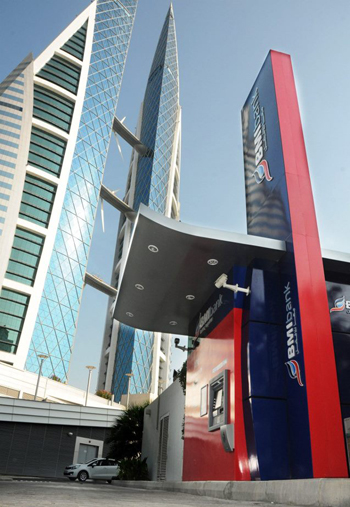 of Kenya in Nairobi and I was talking to them about FATCA. They had no clue what FATCA was and what the requirements were. So the approach to this requirement is not unified across the world. Each country seems to have been taking a different approach or different views toward how to comply with FATCA.
of Kenya in Nairobi and I was talking to them about FATCA. They had no clue what FATCA was and what the requirements were. So the approach to this requirement is not unified across the world. Each country seems to have been taking a different approach or different views toward how to comply with FATCA.
The EU being the closest to the US market and being the most exposed has taken a unified, collective approach toward this law. If you look at the Middle East, I think we have taken at best a country approach and at worst an individual bank approach, like what happened in Bahrain. In Asia, I think ASEAN has decided to go the route of the EU and I think they are addressing FATCA as an ASEAN union of countries. So there is no unified approach on how to deal with FATCA but at the end of the day you have to comply with the rules otherwise even if you don’t have business in the US, the fact that you have US dollar transactions is a big risk for you.
Let’s get back to the 3% growth of the banking sector. Bahrain is certainly over-banked. What do you see are the opportunities for lending and growth, and what are the factors that will enable the growth of the banking sector?
I’ll give you a small example that may relate to the opportunities. Opportunities and growth always come with stability. Unfortunately over the last two years, Bahrain has had its share of turbulences in the Arab world and I believe the growth of 2.5 or 2.6% last year and the year before was basically driven by the fact that Bahrain was not stable politically or socially. If that changes and if hopefully the dialogue that is happening now takes us to an agreement or understanding on how to move forward and deal with the issues that are hanging over our heads, it will all lead to stability. I think once Bahrain feels the stability, you will see a surge of the curve going upward very quickly as far as the economy is concerned.
Secondly, Bahrain is just like the rest of the Gulf state countries. The main economy is driven by the government and the faster the government can introduce a project, the faster we can see growth or activities in the market. A lot of the companies, especially the SMEs, are dependent on government projects that are launched and sponsored by the government. With the Marshall Program that has been endorsed and committed by the other GCC countries, I think we have US $1 billion to spend on projects every year. Most of those projects will be infrastructure projects. Hopefully once that engine starts to work and produces those projects, I think you will see more growth coming up. And hopefully with stability, the 2.5, 2.6 or 3% will translate to 5 and 6%. You may see that in the latter part of this year and I hope we will see it in 2014.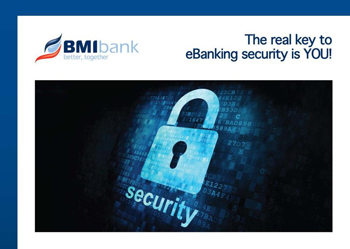
As a Bahraini do you feel the appetite for reconciliation? What is the general mood?
Any dialogue or reconciliation will depend to a great extent on the intentions. If the intentions are there, you can resolve it but if the intentions are not there, no matter what you put on the table one party will reject it. I have to be honest. Today I can’t see the intentions on the table. They aren’t there. I hope that will change in the very near future. The latest decision by His Majesty the King of appointing his Royal Highness the Prince Salman as Deputy Prime Minister hopefully will add to the positive side of how things will go along for the next few weeks because he’s a person that hopefully can pull everyone together and lead the different groups forward.
I hope that as the next few weeks unfold, we’ll see changes in the positions that have been taken by the different groups around the dialogue table. That’s really in all our best interests because I don’t think you can dismiss or cancel any group against the other. No one can. So our faith and our destiny is to work, live and coexist together. Otherwise we will just be like the way we are now which is not serving the purpose or objectives of any one of us.
Let’s look more closely at BMI Bank. How do you assess your performance in terms of key financial ratios and what is the outlook for 2013?
In 2013, we are budgeting and planning to continue our streak of continuous profitability that we started in 2011. Also, we will continue to improve the quality of our assets. We’ll continue to take necessary provisions against any remaining non-performing loans and we’ll continue to make the effort to improve our performance in order to also improve our ratings. We plan to have profits on a quarterly basis and end the year with a profit. Also in our plan for 2013 is to pay dividends to our shareholders after a long time so let’s hope we can achieve that.
Have you seen the surge of non-performing loans in Bahrain as a result of deteriorating business confidence because of the events in Bahrain and how critical is the situation?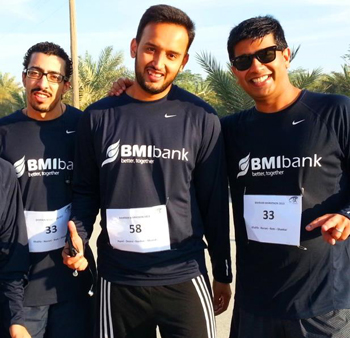
I think that’s a temporary issue – because of the current situation it is understandable. If business lose their business, they are bound to default on loans and during times like this the financial institutions have to be very careful. They have to work with their clients instead of making the position worse than it is. At the same time, we expect the regulators to work with the financial institutions and the companies in Bahrain to resolve or at least overcome this temporary issue.
However, I think and we have seen it over the last two years, some companies have faced great difficulties. We work with them closely because we believe there are good people behind the business and the business is viable. It’s only a matter of time because of the situation Bahrain was going through. A number of them have already turned around and are becoming regular clients.
They are honoring their commitment, they are carrying on the repayment of debt and their businesses are growing. As I said, if you have good people behind good projects, I think it’s a transitional period. You need to work with them, give them breathing time, support them and I think they will turn around. But there’s always going to be some people who will try to take advantage of the situation. Those are the ones that we are not willing to work with.
You mentioned your aim is profitability and paying off dividends. Isn’t it wiser to sacrifice profitability for growth of the bank in your position? You are trying to grow but this will affect your ability to spend funds.
We have grown significantly last year and have opened two new branches in December 2012 and January this year. We are continuously reviewing our ATM network. We are continuously reviewing new initiatives and new strategic alliances. So the growth will always be there but I think it will be more of carefully selected growth in certain areas and fronts. The focus this year will be to continue improving the quality of assets because when we came here as new management in 2010, the quality of assets was very bad.
This has been one of the main headaches in turning this bank around. Today our quality of assets is much, much better than it was in 2010 and we don’t want to lose that. We want to continue building a good quality of assets. With the good quality of assets will come revenue and profits because if you go very aggressively in the market, believe me – you will end up with the wrong quality of assets. So we’ll continue to grow and make money and we’ll continue to focus on both sides of the balance sheet but it will be a more focused approach.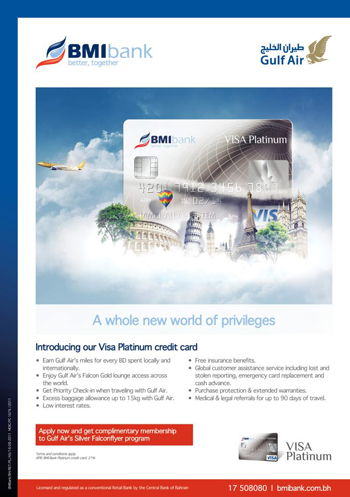
Everybody is seeking good quality assets. NBB is known to be a very conservative bank that is focused on high quality assets. There is so much competition and saturation in the market. How do you end up with quality assets? What is your magic recipe?
In the past for example, we had an open market policy which means that everybody qualifies for a consumer loan whether it’s auto, personal, mortgage, credit card or what have you. Today we have targeted clients and approved list of clients so if you don’t fall within those two circles, you are an exception. An exception means it has to be escalated to the next level. Honestly, the only person who can approve financing like that is me as the CEO. So we have narrowed the assets that we are willing to take on our balance sheet to a certain segment of the economy and the market that we feel comfortable with. We are not into the masses anymore. This is what we used to do in the past and that’s how we lost our share. Today we are very selective and focused.
You mentioned the example of NBB. NBB receives funds that they don’t even want, so it’s very easy for them to be conservative and to make money and to choose the assets they want whereas we have to work much harder on obtaining the same quality of assets like somebody like NBB will obtain. There is a difference between the two business models.
You must be innovative and you must be working on your brand. Can you outline some of your strategies?
Our strategy is to continue providing our customers and the marketplace with the innovative products that hopefully will increase the number of customers that we have and will increase exposure of our brand in the marketplace. Some of these products and initiatives are in-house product initiatives, some are through strategic alliances with other institutions whether in the local market or outside Bahrain, and some of them are white labeling.
We will take the product of someone and bring it here under a white label agreement to present it to the local market. I think we are rolling out a number of them. I cannot disclose them now because we are signing a number of them but you will see over the next few weeks a number of products that will be launched by BMI just to enhance the range of services and products that we are offering to our customers and the local market.
In your opinion, what does it take for a long-term customer of a certain bank to switch banks?
I’m a customer of banks. I’ve been a customer of banks since 1978 or 1979. As a customer, even before coming here, I would only switch for service. I would not switch for a price. It’s very easy. The customer you get on a price, you will lose them on a price but the customer you get on services, it is not easy to lose them on services. In my own personal opinion, services is on top of the list of how to maintain your customers – being close to them, addressing their needs and being there at any time they need you. I think that’s the main thing.
We have replaced at least 80% – if not 90% – of the senior management of this bank.
Bahrain has a limited market. It’s a closed market with a limited number of people working in the banking sector. You cannot tap into other resources. There is a limited labor pool in Bahrain. How do you select your employees?
I will give you an example and this has been repeated a few times. We have replaced at least 80% – if not 90% – of the senior management of this bank. We have not put one single ad in the newspaper and we have not used any headhunters. As you said, Bahrain is very small and you know the pool of talent and you know the quality of people that you want to recruit and the competencies and you go after them. But you have to tell them a story. You have to tell them a good story that they believe in and that you don’t mislead them so when they come here they can actually see the story.
So yes, we have a limited pool of competent, well-trained people but I think if they believe in the story, they will come and join us. I think we have been fortunate to be able to attract a good, young management team to BMI. In addition to that, you do have good people within the bank that were lacking leadership and clarity of leadership. Today you have a pool of young people that are waiting to be led and trained and see the story with you. This is also what we are doing. We are not interested in C players, only A or B players. This is how this bank will be driven and how this bank has been driven over the last two and a half, almost three years.
I’m interested in the story. What is the story behind BMI Bank?
I’ll summarize it in something I have practiced all my life and throughout my career. This is not a place of work; this is a place where you enjoy what you are doing. If you don’t enjoy what you are doing, that’s not the place for you. You have to like waking up in the morning and coming to the office. You don’t feel you have to wake up in the morning and come into the office. That’s our philosophy and that’s what we are working on. We start work at 7:30am every day. Come here at 7:00am and tell me how many people you see in the office. Nobody is telling them to come at 7:00am. This is the difference. You have to love and enjoy what you are doing and if you have that, you’ll give it 120% rather than 90%.
This is the story of the bank. In order for you to move forward, grow and achieve results, you have to have a team that enjoys and loves what they are doing at work and that does not feel forced to come and do the eight hours and leave because then that becomes only a job. It’s not a career.
Would you have a final message summing up the present situation in Bahrain and its future evolution?
I think Bahrain has gone through these difficulties many times in the past. Bahrain has seen these times more than once and we always come out of it as Bahrainis who are stronger and more eager to work and develop this country. I think this time is not different than the others although it is more severe than the previous times. I think we all have the will and intentions to move forward at the end of the day. Yes, we do have hard times and hurdles during the road and that’s understandable.
Everybody is in their own trench and everybody’s taking a position but at the end of the day, when push comes to shovel, I think you will see Bahrainis rising to take this country forward and reconcile their differences. I’m not worried. The only thing that really concerns is that twenty years ago, one year would have been okay; one year now is a long time to be in a standstill. The world is not waiting for you. Everybody is moving very fast so you have to make up your mind and move forward much more quickly than twenty years ago.